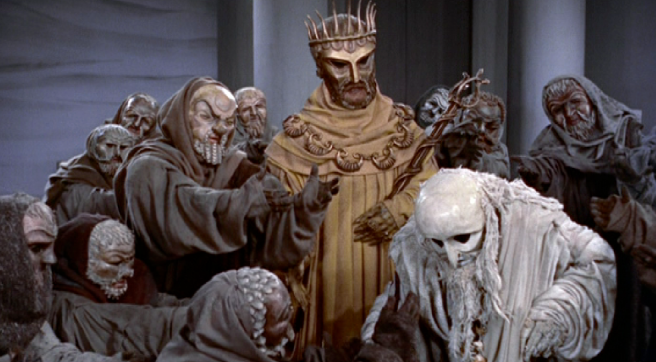
Flashback to high school lit: Oedipus Rex. The classic and woeful tragedy of the guy who, by some cruel twist of fate, ends up killing his father, marrying his mother, and gouging out his eyes after he realizes all that he has done. This Greek tragedy follows the tradition of the hamartia, the tragic flaw.
Turns out, this is also the word that the Bible—at least the Greek portion of it—uses for sin. According to Blue Letter Bible, the word hamartia is used for sin as a noun, hamartanō is used for sin as a verb, and hamartēma is a noun used for single sins or evil deeds.
But I think the mistake we often make is subconsciously confusing the concept of the tragic flaw from Greek tragedy with what the Bible says about sin. On one level tragic flaw is a mistake, an error, made by chance or the cruelty of fate—for Oedipus, this was…y’know…killing his father and marrying his mother. But on another level, the tragic flaw is a character flaw—the pride that caused Oedipus to kill strangers after an argument on the road or the pride that blinded him to the truth.
And I think we apply the same kind of thinking to sin: If only he didn’t have that affair, if only she didn’t keep wrecking her life with drugs…maybe they could have been good, decent, Christian people. If only I wasn’t such a potty mouth, if only I didn’t cheat on that test, if only I wasn’t secretly addicted to porn…maybe then God would love me.
But sin is so much more than a tragic flaw. It goes far deeper. The Bible tells us that it’s not just one thing separating us from God. It’s not just one mistake or one character flaw, or even a handful of them.
In his excellent sermon on work, Tim Keller explains that the concept of total depravity is not that we’re as bad as we could be, but it’s that every part of us is tainted by sin. By all means, it shows up differently in each of us—some have had the privilege of growing up in loving homes or church families, while others have had nowhere else to turn but to sin. But whether we turn to the “respectable” sins of pride, judgmentalism, and gossip or the more societally condemned sins of alcoholism, theft, and murder, we are all alike under sin. And more than the bad things I do, the Bible tells me that even my best thought or word or deed is still ruined by sin and displeasing to God, as Isaiah 64:6 declares, “all our righteous acts are like filthy rags.” Or, as I like to say, “I can’t even do good right.” Romans 3:23 puts it most succinctly: “For all have sinned and fall short of the glory of God.” (emphasis mine). Sin is what makes all of us fall short of God’s perfect standard.
And so we see that we are not just flawed people with one or two things that need to be patched up, but totally irreparable people who need to be made completely new. And it’s not just one piece of me that needs to be replaced, but all of me. And this is precisely the work that Jesus does on the cross. He takes my unsalvageable life, completely soaked in sin and replaces it with the life that He has lived perfectly, not one thought or deed or word or motive even a millimeter off—He was the flawless lamb. And this is the work that the Holy Spirit is doing in the lives of those who have placed their trust in Jesus: while outwardly they are wasting away, inwardly they are being renewed, day by day. Sanctification. Being made into the righteous people that we could not become on our own.
I think this understanding of sin and of the gospel has two huge implications for the believer:
First, in our own lives, seeing sin in its entirety surprisingly frees us from legalism. It’s the freedom to stop trying to fix ourselves. When I understand that my guilty standing before God is not just on account of one or two sins that I keep running to, I stop my white-knuckled attempts to prevent myself from sinning. For in my own life, I find that even after I overcome one sin, I find ten more staring me in the face. Paul too, finds this law at work in Romans 7:21, that “Although I want to do good, evil is right there with me.” That’s not to say I should pay no mind to sin and do whatever I please because avoiding sin is some hopeless cause. The believer does avoid sin, but their entire motivation for doing so has changed. It is no longer to earn the favor of God—they have that through Christ—but they avoid sin out of obedience to a loving Father who is growing them into people who are holy as He is holy.
And this understanding of the extent of sin changes how we see and approach others. It humbles us, to say “There, but by the grace of God, go I.” The quote is traditionally attributed to John Bradford, who, upon seeing a criminal heading to execution, is reminded that it is not his own inherent goodness that kept him from such a fate, but purely the grace of God that keeps him from sin. And so instead of looking down on people for not being as good as us and trying to fix them by forcing upon them our legalistic rules and regulations, we realize that we are all alike under sin and no human effort can fix our deep problem of sin. And so we offer them the only hope there is—Christ. Christ Jesus who alone has the power to remove our condemnation and make us holy.
